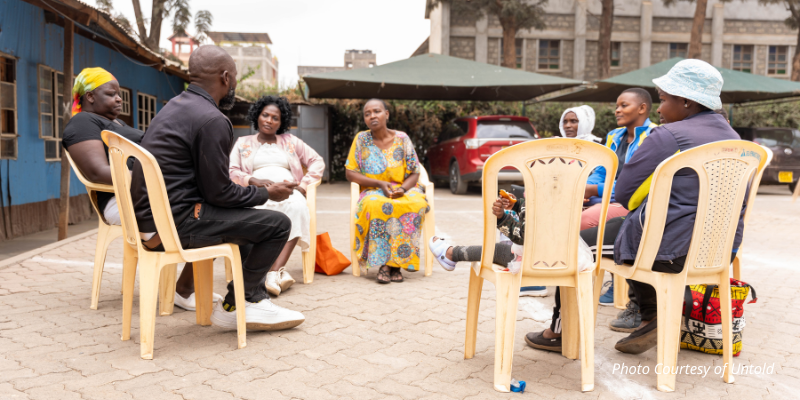Finding Hope in the City: The Challenges and Opportunities of Urban Ministry in the Majority World
Cities are full of motion. Crowded streets, shifting populations, and people searching for stability and opportunity. For ministries walking with those facing poverty, urban settings bring unique challenges alongside meaningful opportunities for restoration.
Two of our partners—Untold, which walks with individuals affected by HIV and AIDS in Eastern and Southern Africa, and Chalmers Model Training Centers in Togo and Ghana—reflect on their experiences working in urban settings. Both use the RESTORE savings group curriculum and are committed to Christ-centered, relational work. Their insights shed light on what it takes to serve well in urban contexts and why it’s worth the effort.
The Complex Realities of Urban Life
1. High Mobility and Weak Social Networks
Many people living in informal urban settlements didn’t come with long-term plans. They’re in transition—looking for work, escaping hardship, or just trying to survive. As Molly Heacock, Managing Director of Untold explains, “Most people are not settling in an informal urban settlement with the intention of being there forever.” The result is often a fragile community fabric, where relationships are temporary and family support is missing.
This is especially true for Untold clients living with HIV, many of whom have been cut off from relatives due to stigma. “We have story after story of clients who were kicked out of their homes,” Molly shares. “They find themselves socially isolated and without a safety net.”
2. Constant Busyness and Economic Pressure
City life is demanding. People are busy working long hours to meet the high cost of living. Rent, utilities, and transportation eat into wages, leaving little time or financial margin. “People don’t have time,” says Kwasi Ayivi, Executive Director of Chalmers Model Training Center in Togo. “They are very busy with their work.” This can make it difficult for savings groups to meet regularly or for people to participate fully in ministry activities.
3. Resistance from Urban Churches and Leaders
While rural pastors may welcome outside support, urban churches often have full schedules and are less receptive to programs like savings groups. In Ghana’s cities, some church leaders are skeptical or feel that addressing material needs isn’t part of their mission. When pastors are hesitant, it’s harder to build trust with church members.
There’s also heightened suspicion of new initiatives. In areas where financial scams are common, savings groups can be misunderstood. “Urban folk usually are skeptical,” Joseph Antwi, Executive Director of Chalmers Model Training Center in Ghana explains. “They can’t see it as a ministry. They simply see it as business.”
What Urban Contexts Make Possible
Despite these challenges, the city also offers meaningful opportunities for ministry to take root and flourish.
1. Proximity Makes Relationships Easier
For Untold, urban clients often live close to each other and to program centers. Unlike rural work, where home visits might require hours of travel, urban visits can happen more frequently and consistently. “We’re able to do home visits really consistently,” Heacock said. This makes it easier to build deep, long-term relationships and support clients on a more regular basis.
2. A Stronger Network of Services
Urban areas typically offer more access to clinics, hospitals, and other support services. That opens up more paths for referral and partnership. “We rely on networks of other organizations doing great work,” Heacock said. This allows each group to specialize and refer clients as needed, instead of trying to meet every need internally.
Church partnerships are often more strategic too. In urban areas with multiple churches, ministries can look for those already aligned with their values and mission, which leads to stronger, more fruitful collaborations.
3. Creating New Family and Belonging
Many Untold clients have lost or left behind their families. Through their comprehensive program, including RESTORE savings groups, they find something deeply meaningful: a new sense of community. “This is my new family,” one client shared. Others refer to peers as spiritual mothers and fathers. These relationships aren’t just social. They’re healing.
4. Trust Can Lead to Deep Commitment
Although many city dwellers are cautious at first, once they understand the value of the program, they often become some of the most consistent participants. “When urban folk are fully persuaded,” Antwi observed, “they are able to commit better to the savings program.” They value time, respect structure, and tend to show up when expectations are clear and the vision resonates.

A Ministry Worth Pursuing
Urban ministry isn’t just a rural model transplanted into a different setting. It asks something different. It requires listening well, adjusting often, and walking patiently with people whose lives are marked by constant change. Programs like RESTORE can thrive in cities, but they need time, trust, and strong relationships to take root.
Even when growth is slow or skepticism feels like a wall, hope is still present. People rediscover belonging. Churches begin to open their doors. And savings groups become a space not just for financial habits, but for dignity, connection, and healing.
As Antwi put it, “Urban savings group ministry, though challenging, is exciting. We continue to see God’s hand at work.”
That’s reason enough to press on. To stay in the city. To keep showing up with faith that God is already moving, even in the places that feel hardest to reach.


